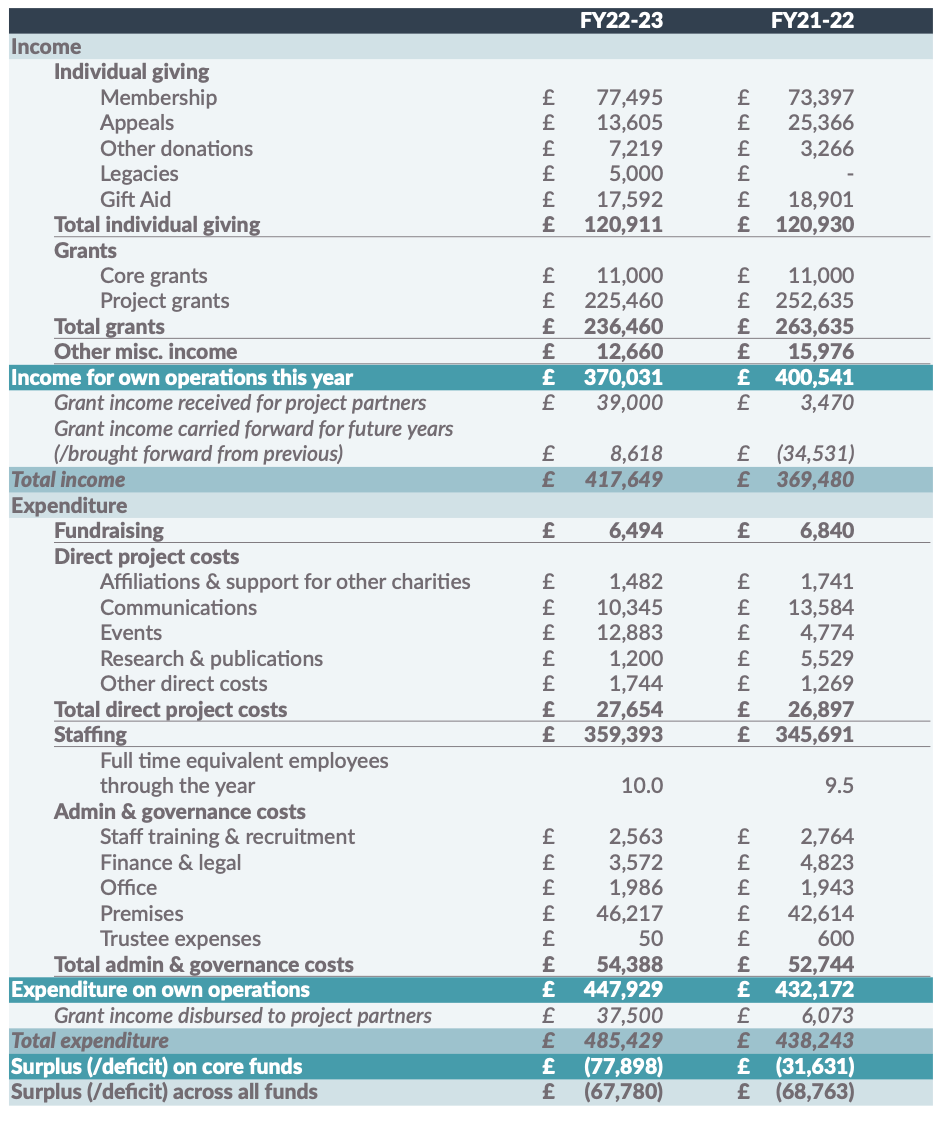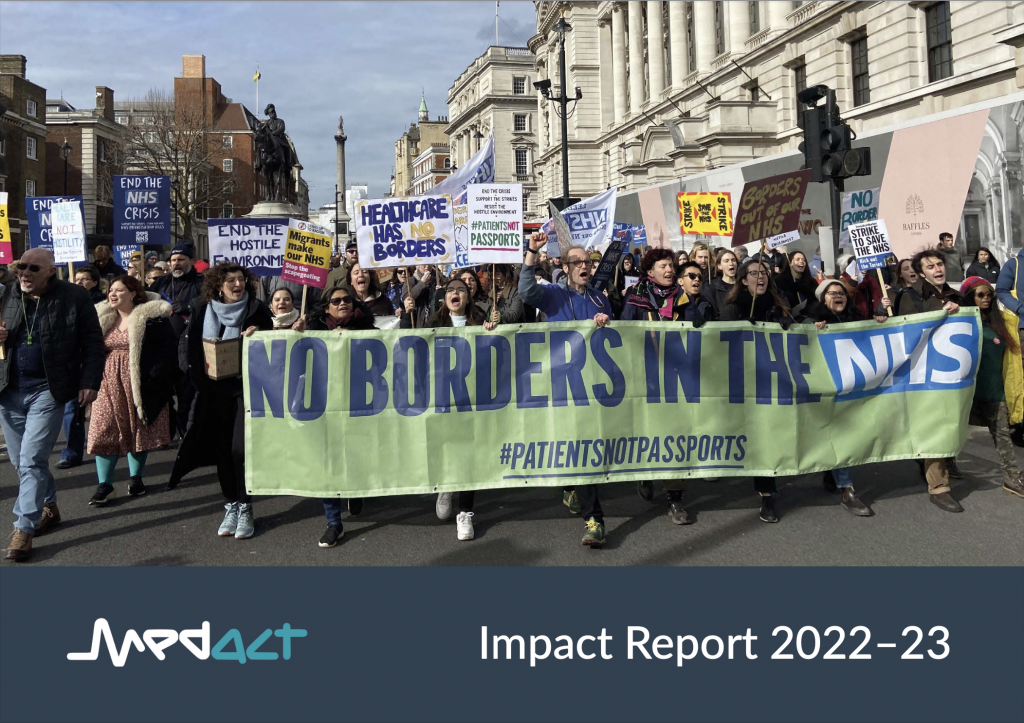This is the digital edition of our Impact Report 2022–23. You can also download a PDF version.
A message from the Chair
Professor Anuj Kapilashrami
Chair of the Board of Trustees
It is a great privilege to step into the role of Chair of the Board as the Medact movement embarks on its next phase of evolution. I do so with deep concern for the current world order, but also with hope built through the relentless efforts of health and social activists and campaigners like yourselves.
Medact is in a period of transition: in 2018, we set out a strategy for how to build up the movement of health workers campaigning for change – it’s clear now we’ve outgrown even the vision set out five years ago, with more health workers taking action across more issues of health justice than ever before. This year we have embarked on setting out a new strategy to guide our fight for health justice, and the team and I look forward to sharing ideas with you as we work on this as a movement.
The new strategy is timely. We are living in unprecedented times that are marked by multiple crises – of the economy, environment, politics, social, and of (mis)information. The call to ‘build back fairer’ in the aftermath of the pandemic has been met with perverse developments in political and policy space. The same political forces that have been making life so hard for households across the country are also squeezing the budgets of small organisations like ours, and competition for funding is only growing.
This difficult financial environment is intertwined with relentless attacks on our rights – from the criminalisation of routes to safety in the “Illegal Migration” Act, to crackdowns on our civil liberties in the Public Order Act, to a redoubling of efforts to divide societies on racial, religious and gender lines.
This is evident in the rising anti- immigrant sentiment that is driving regressive housing policies for refugees, the demonising of Muslims following the Shawcross review of Prevent, and a failure to acknowledge and address systemic structural racism that plagues public institutions today. At the same time, the systematic underfunding of our health service and exploitation of health workers is making health justice harder to achieve.
These are attempts to further entrench the systems that deny people their fundamental right to health. But we have not stood idly by. Health workers up and down the country have taken action and organised across all of our campaigning areas, from taking to the streets during the climate talks, to organising ‘strike schools’ during the health workers’ industrial action and supporting people who’ve been unjustly charged for lifesaving NHS care.
It is especially inspiring to see global solidarity in action over the last year, with our members joining forces with grassroots community groups on housing and police in mental healthcare, to the coalition with Global South land and human rights defenders in the People’s Health Tribunal.
And we will only redouble our efforts going forward, focusing our strategy and our organising efforts in the struggle for health justice, as we have done throughout the year.
Hellos and goodbyes
People are at the heart of any movement, so among the most impactful of the transformations this year have been the changes to personnel. We welcomed Sophie Neuburg back from maternity leave, with huge gratitude to the team of Co-Directors – Benjamin Walpole, Becky Daniels and James Skinner – who led the team in Sophie’s absence with a collaborative and participatory approach, true to our values. Sophie is now supported by two Deputy Directors in Rosie Clarke and TJ Chuah.
We said goodbye to Reem Abu-Hayyeh after over five years’ deft leadership of our Peace & Security programme, which expanded our purview into the critical space of creeping securitisation and violence within health services, and to Rob Abrams, who was instrumental in building our Health for a Green New Deal campaign from the ground up in his roles as Movement Organiser and Climate & Health Programme Lead. And after seven years’ keeping the organisation running smoothly as our Operations Manager, Benjamin Walpole has stepped down. Many thanks to Ben for his work without which Medact would not be what it is today.
Reem is succeeded by Sarah Lasoye, who brings a wealth of Medact experience from her role as our Campaigns Officer and having taken up the reins of our Peace & Security work during Reem’s sabbatical leave. Adedotun A. Adefehinti joined us as our new Finance Manager in July, and we are about to welcome Maria Carvalho as our Climate & Health Programme Lead, and Kate Bernard as our new Movement Organiser.
Lastly, five of our trustees stood down this year: Tom Wakeford, Lisa Murphy, Annabel Sowemimo, Hannah Harniess, and our former Chair Alan Maryon- Davis who stepped down after three years of steady guidance.
Thanks to everyone who has been a part of this work – we couldn’t do it without you and your belief and commitment to the movement. As the movement continues to grow and evolve, we need to double our collective efforts in organising at the grassroots and making our work and impact more sustainable. Your work, support and financial contributions are critical for this. In the coming months, we will seek to inform the movement’s vision and new strategy with your collective insights, wisdom and experiences.
I look forward to seeing many of you at the AGM, and I have absolutely no doubt that we can look forward to the new year with hope and confidence in bringing about meaningful change.
Patients Not Passports
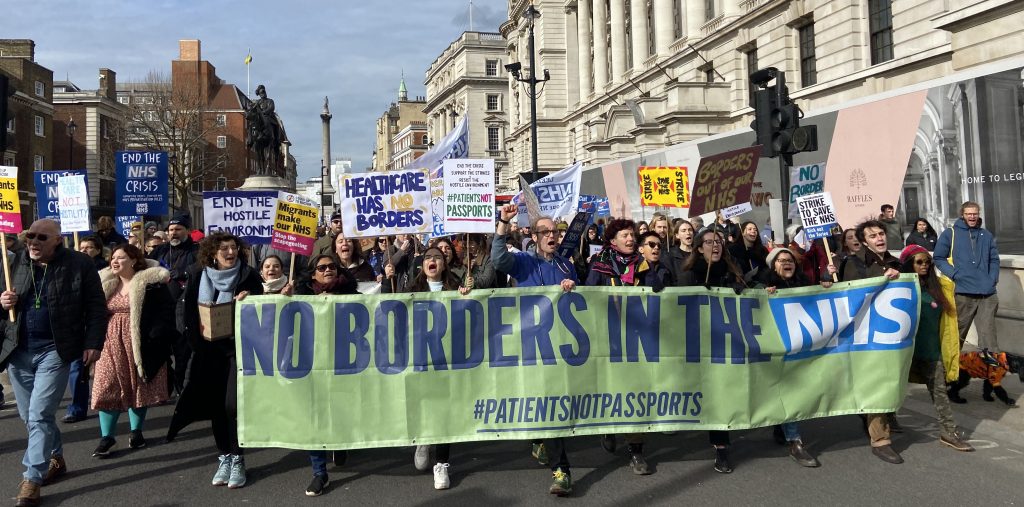
This year the continued attacks on human rights have felt relentless, with the ‘Illegal Migration’ Act criminalising routes to safety, and the NHS charging regime still denying so many the right to free access to healthcare. But in the face of these attacks Medact and the Patients Not Passports network are standing strong in the fight against racist borders in healthcare. Through sharing experiences, knowledge and solidarity, we challenge the Hostile Environment in healthcare – and by building this movement we can become unstoppable! We win this fight by coming together. This is why it was so important this year for us to meet together in person, both through taking to the streets and at our huge gathering!
At the end of September, we brought the Patients Not Passports Network together for the first time in five years, to reflect on all we’ve achieved, and to start planning how we will continue the fight and win a healthcare system accessible for all. Fifty-five people took part in sessions over two days. We shared stories, made connections, and set out our priorities for the year ahead, including workplace organising, community organising, awareness raising and training, improving our communications, evidence gathering, and advocacy with major unions.
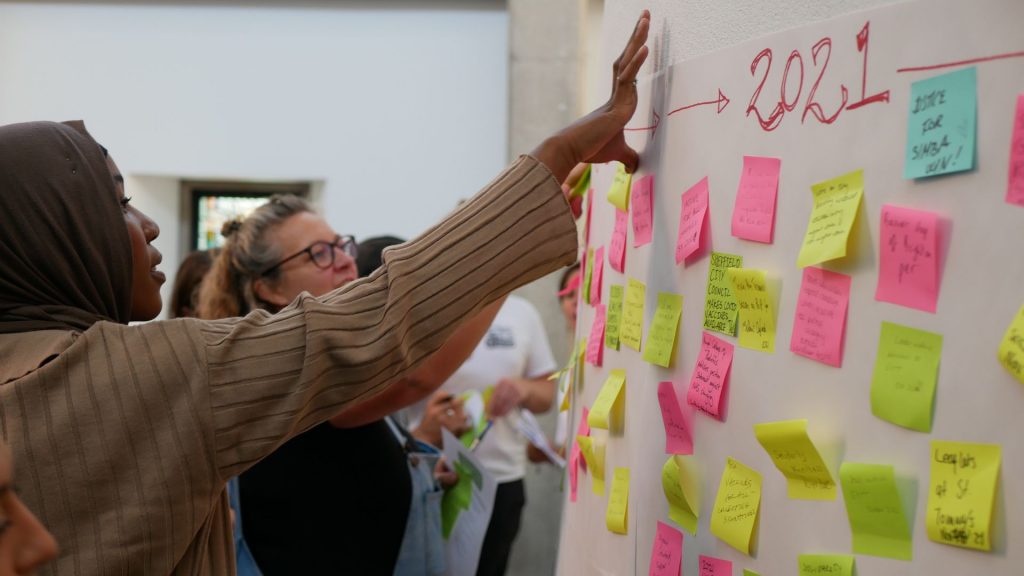
In March, tens of thousands of people took to the streets, marching to defend the NHS from privatisation, underfunding, gross undervaluing of workers, and insidious and exclusionary immigration controls. Patients Not Passports formed a ‘No Borders in the NHS’ bloc at this national ‘SOS NHS’ demonstration, marching to joyfully show our resistance.
This year we also began to support the campaign to drop the debt of three-year-old Omisha in Redbridge, East London. Omisha was billed £76,000 for life-saving cancer treatment on the NHS and her family were hounded by Barking, Havering and Redbridge University Hospital NHS Trust. In her mother Reeja’s words: “They tried to send debt collectors to chase me and my husband for payment, even when we told the hospital that we could not afford to pay.”
Under pressure from the petition and public campaign, the hospital confirmed that it will no longer pursue payments! But the debt still stands – ultimately, it rests with the government and the unjust laws we’re fighting to scrap. Omisha’s family are campaigning to truly be free of this debt, and to end charging in the NHS so that other families are not forced to go through what they did.
In July the government announced plans to almost double the immigration health surcharge and increase visa fees in order to fund public sector pay rises. These racist proposals pitted worker against worker, presenting a vital moment for unions and organisations fighting for migrant rights to stand united and reject this attempt to sow division. We worked with Migrants Organise and the Joint Council for the Welfare of Immigrants to coordinate two solidarity statements, one signed by over 60 unions and migrant rights organisations, and the other by over 3000 workers, union members and individuals.
This year we will keep growing the campaign and our power to overturn racist and hostile immigration controls in the NHS. We’ll be launching a new and updated NHS charging toolkit and website, focusing our organising on building power within NHS Trusts, and supporting more people that have been charged for care to campaign for justice.
Our work on NHS charging is possible because of the collaborations, partnerships and coalitions that are the heart and soul of the Patients Not Passports campaign. We’re proud to work alongside so many incredible organisations, local groups and individuals including those at Migrants Organise, Docs Not Cops, Keep Our NHS Public, and Save Our NHS, as well as Patients Not Passports groups and all the people across the country taking a stand against racist immigration policies.
Economic Justice & Health
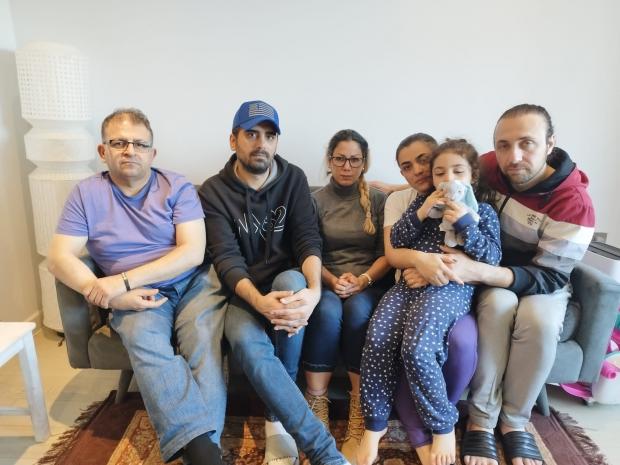
Jordi López Botey’s first full year at Medact has seen our programme turn its focus towards housing injustice and the harms to health it is responsible for. Medact is now the health-worker voice within the New Economic Foundation’s Homes For Us coalition, and members are taking action to support communities on housing. Local groups also ran Strike Schools by pickets during the NHS strike-wave this year, helping to link health-worker pay and conditions with wider economic justice struggles (find out more in the Our movement section!).
Over the past months, group members have engaged in localised tenant-led housing campaigns, using their knowledge and experiences as health workers to speak to the health impacts of poor-quality, poorly-maintained housing. We began working closely with community groups fighting against atrocious housing conditions, supporting them in solidarity with their fights, starting in Druids Heath in Birmingham and Harrow in West London.
We’ve been supporting the Druids Heath and Monyhull Community Forum with ‘Build 1st’ – a community campaign organising against the demolition of council housing. Druids Heath is one of the most deprived areas in Birmingham and it sorely needs investment for the community to thrive. Instead it is getting ‘regeneration’ – in April 2019, the council began demolishing tower blocks on the estate and relocating residents across the city.
The campaign’s aims are not only to ensure alternative council housing, but also to propose community-made plans that address existing health inequalities in the area. We launched the health-worker petition echoing the community’s demands: Birmingham City Council must build first, ensuring there are homes in the area before any further Druids Heath tenants are evicted.
And in Harrow, alongside Harrow Law Centre, we’ve been supporting local residents whose health is being harmed by the appalling conditions at Krissh House, a converted office building that is covered in black mould and damp. Interviews performed by Medact members found the majority of children and adults living there were experiencing major health impacts due to these conditions, ranging from asthma to chest infections, allergies, skin problems and mental health difficulties.
The Harrow Times wrote about the case and spoke to our group members, including children’s A&E doctor Amaran Uthayakumar- Cumarasamy, which helped to pile the pressure on Harrow Council, which is now preparing to take legal action against the private landlord!
We also held a Harrow Housing and Health hearing in May, where we invited residents from across Harrow to share their experiences. We are now looking to grow our campaign, supporting more tenants in blocks, onboarding more local health workers and increasing the pressure on the council.
In spring, we held our first London Housing & Health Group meeting, which brought together Medact members to discuss the role that the health justice community can have in fighting back against the health impacts of atrocious housing conditions. This group supports our work in Harrow through research, power mapping and advocacy – and in July we ran a housing workshop for health workers alongside London Renters Union.
If you want to get involved in this work or would like to support starting a similar group in your area, get in touch!
Peace & Security
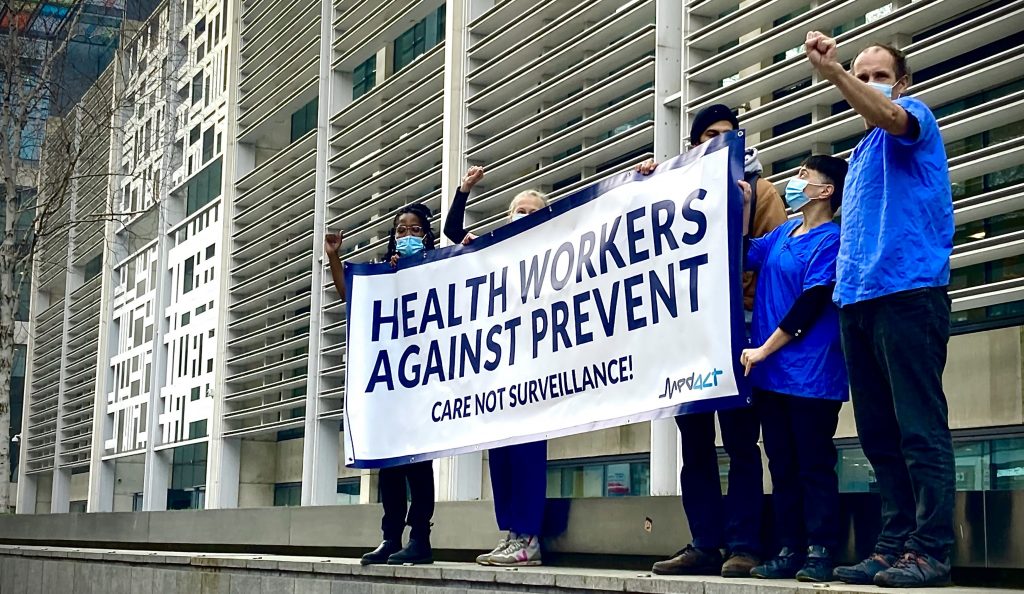
It was a year of change for Peace & Security at Medact, as we said goodbye to Reem and welcomed Sarah into the campaigner role.
After over a year of waiting, the so-called Independent Review of Prevent was finally released in February, authored by known-Islamophobe William Shawcross. The Shawcross review pushes for stricter enforcement of the Prevent policy and an expansion of the duty within public services, whitewashing the widespread and longstanding evidence of the policy’s harms, including the health impacts we uncovered back in 2020.
We were ready to respond, launching a day of action and a Health Workers Against Prevent Pledge, signed by hundreds. Members of our Securitisation of Health Group distributed flyers outside St Thomas’ Hospital to raise awareness of the duty’s harmful impacts on patients and health workers alike, and staged a protest at the Home Office to show the government that health workers will continue to stand against Prevent and resist co-option into state surveillance and securitisation practices.
The Day of Action on Prevent was followed in March by a roundtable discussion that brought together members and representatives from the psychiatric community, including the BMA, RCPsych, BACP, and the Muslim Counselling and Psychotherapist Network. The focus was on addressing the harmful impacts of the Prevent duty in mental health care, and attendees explored how the Prevent duty exists in conflict with existing ethical frameworks used by providers – contradicting spaces of care, dependent on trust.
In our continued work to resist arms and nuclear weapons, Medact members played an active role in two significant conferences this year as the UK’s affiliate to International Physicians for the Prevention of Nuclear War (IPPNW). Medact Member Bimal Khadka, who is the youngest doctor on the IPPNW Board of Directors, joined the European Meeting in Hamburg in January, helping to shape the Hamburg Declaration, which issued a renewed call for peace in Europe.
Bimal also attended the long-awaited 23rd IPPNW World Congress in Kenya, themed on ‘Disarmament, Climate crisis and Health’. This was the first IPPNW global conference since the start of the Pandemic, and the first to be held on the African continent. More than 40 countries and 300 people participated both virtually and in-person, making the links between the health consequences of the climate crisis and nuclear weapons. It culminated in the ‘Mombasa declaration’ and an appeal for peace and prevention of nuclear war.
Members in Medact Scotland also took local action on the Don’t Bank on the Bomb campaign, as well as on the conflict in Ukraine. Read more about this in the Our movement section of this report!
The Criminalising Distress research project was also launched during this period, led by our Research & Policy Manager Hil Aked and members of the Medact Research Network (MRN). This project is actively exploring the intersection of mental health and the criminal justice system through the SIM initiative, which involves police in the routine therapeutic interventions of “high intensity” mental health service users – a stark example of the securitisation of health. Find out more about the project in the Research section of this report!
We’re looking forward to the upcoming year of organising against nuclear weapons and the global arms industry, resisting the securitisation of our health services, and seeing the transformations that Sarah will bring to these campaigns!
Climate & Health
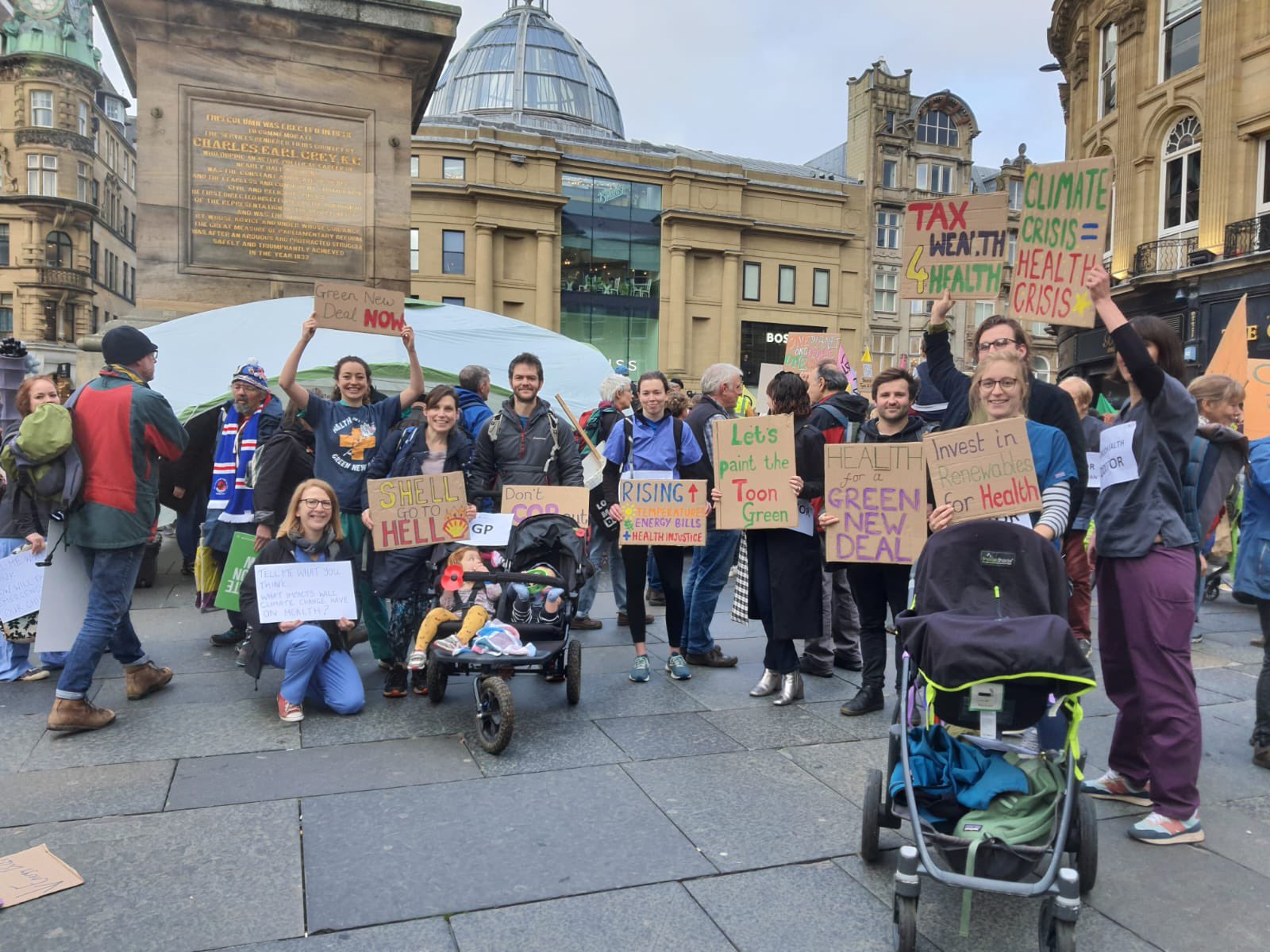
In April 2023, Medact said goodbye to Rob Abrams, who had been the Climate & Health Campaign and Programme Lead for the past two years. Rob played a key role in building Medact’s climate and health programme. The second year of Medact’s Health for a Green New Deal campaign saw more of our local groups organising and taking action. There are now local Medact groups working on Health for a Green New Deal across the UK, with people taking action in their communities, as well as organising nationally on the health impacts of climate change, and campaigning for a just and sustainable transition to a Green New Deal.
On 6 November 2022, health workers from across the UK took to the streets in protests for the Global Day of Action for Climate Justice which was taking place in cities around the world, show- ing solidarity with those communities on the frontlines of climate violence who were being excluded at the COP27 climate talks. Our members organised health blocs at marches in six cities across the UK – Sheffield, Bristol, London, Edinburgh, Newcastle and Blackpool! Hundreds of health workers turned out in a powerful show of solidarity from the health community.
And we weren’t just out on the streets for the talks: some Medact members were in Egypt influencing the narrative, including at an event streamed live from Sharm El Sheikh: ‘Healthy Prescription for a Green New Deal: From Advocacy to Action’. These members brought together a panel of activists from the global movement for health and climate justice to discuss the need for a transformative Green New Deal that centres the health of people and planet, highlighting the importance of the health community’s role in the struggle.
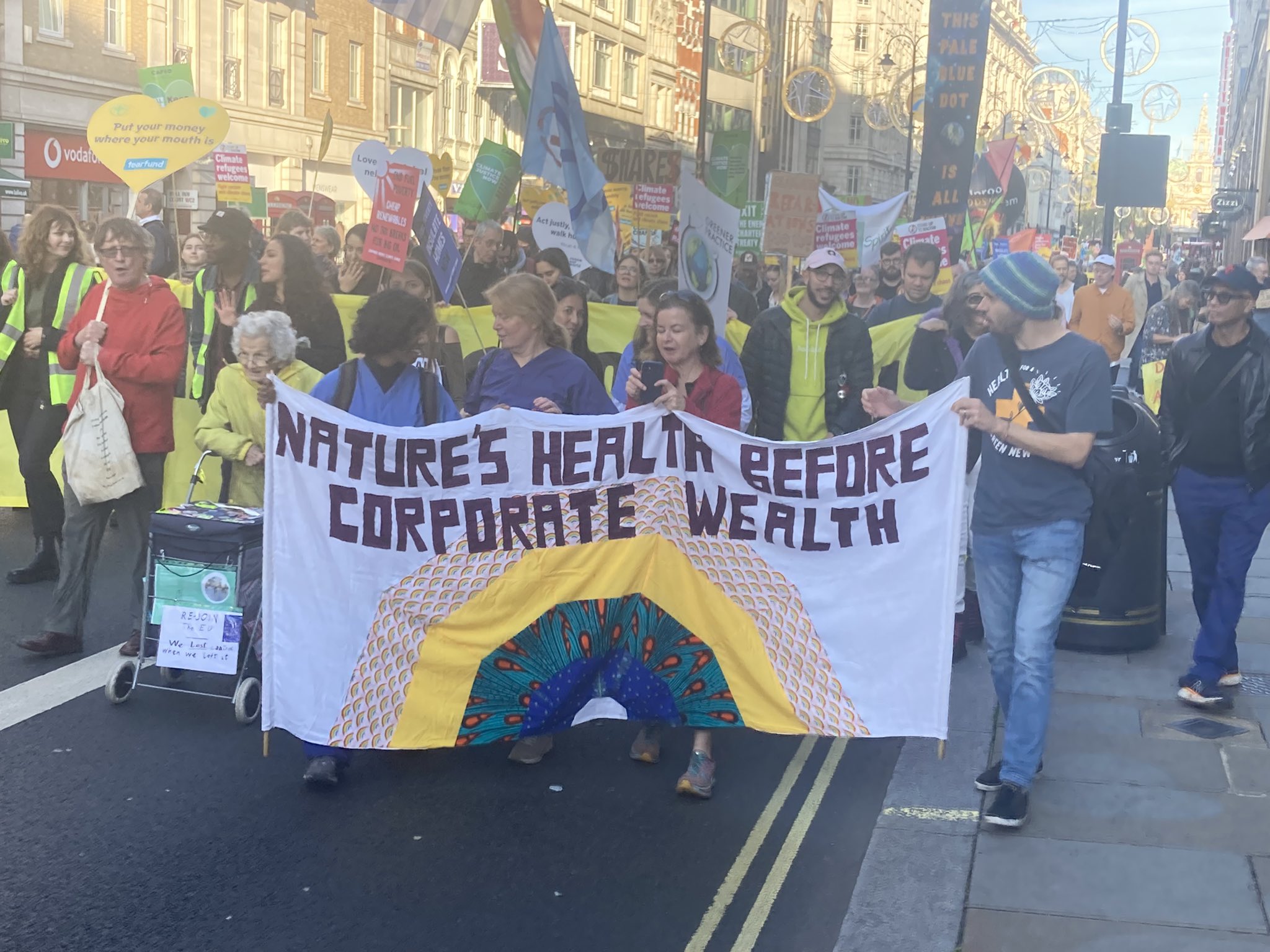
In May, Medact took part in organising the People’s Health Tribunal, in which communities from across Africa came together to examine the health impacts of the fossil fuel industry in the continent and put Shell and Total on trial! People facing the worst of the violence of extractive industries gave testimony, sharing their experience of direct and systematic harms to health, and of resistance. The panel of judges found that the companies’ actions amount to effective genocide and ecocide. Hundreds joined to bear witness, both from home and at community watch parties across Europe and Africa.
Over the last year, Medact Groups that focus on climate have been taking local action, joining forces with communities in struggles against airport expansion, waste incinerators, the proposed Rosebank and Jackdaw oil & gas fields, and more. They put on Climate Clinics to have conversations about climate in their communities, and took part in national moments such as The Big One at Parliament. Check out the Our movement section of this report to hear more!
The Health for a Green New Deal national planning group has been strategising for campaign actions for the coming year, and we’re looking forward to a renewed focus with new campaigner Maria coming aboard in August!
Research: Criminalising Distress
For the last year, the Medact Research Network (MRN) and our Research & Policy Manager, Hil Aked, have been focussed on a new piece of primary research called Criminalising Distress: empowering patients, challenging police in mental health care.
This is an urgently needed independent national study exploring Serenity Integrated Mentoring (SIM) – a model that embeds police officers within community mental health teams. It is a stark example of the securitisation of health, and was at one stage used by almost half of mental health trusts in England.
Following a campaign by lived experienced-led group StopSIM, NHS England told trusts to review the approach. In March 2023, it said the model should end – but did not publish the policy co-produced with StopSIM or apologise for its own role in promoting SIM originally. Like StopSIM, Medact is concerned that SIM-like practices which criminalise distress have not ended.
This is the first major piece of primary research we’ve set out to do with the MRN, and the first that has been steered from the start by community members affected by the issue at hand: former members of the StopSIM coalition continue to act as the steering committee for the project, even though their campaign group has disbanded. The research was granted ethical approval by the University of Greenwich.
The Criminalising Distress team is conducting a literature review, filing and analysing Freedom of Information requests, and conducting interviews which will include service users directly affected by SIM – as well their family members, health workers and other stakeholders. Our main aim is to foreground the voices of those most impacted.
We have published other reports and briefings in the last year too, including a report on the medical consequences of “contingency accommodation” for people seeking asylum, written by members of the Medact Migrant Solidarity Group, and a write-up of a study conducted with our members on the relationship between health workers and non-violent resistance, which was led by Dr Ryan Essex of the University of Greenwich.
It has been an exciting year for the Medact Research Network, as we have begun to explore the benefits and challenges of doing long-term, primary research within the team, bringing in the different skills of our members, while also being true to our values in being guided by those most affected by the issues we’re working on. We’re looking forward to publishing our findings, and hope they will contribute to ongoing ef- forts to secure accountability and resist the securitisation of health.
Our movement
It has been wonderful to come together in-person more this year, with our first hybrid AGM held in Sheffield last October, the huge Patients Not Passports gathering, and new regular meetings like the Housing & Health London group. We’ve also continued to meet-up online – our Local Group Coordinators are now regularly meeting to share skills, including a reflective discussion on safer spaces, facilitated by the Race & Health Justice Group, and discussions on power dynamics within Medact spaces.
And our Local Groups have been taking action! Here’s a selection of reports from some on what they’ve been up to:
Brighton
We welcomed the new rotating doctors at the end of July, and recruited on social media, bringing in an influx of over thirty members from all hospitals in the area! We have since brainstormed climate campaign ideas specific to Brighton. Three of our members went to the Patients Not Passports gathering, which was followed by a training on identifying local actions. In November, we attended a Sanctuary on Sea gathering with other local groups supporting refugees and migrants.
Our outcomes include influencing the introduction of sustainable Quality Improvement Projects for junior doctors, advancing our Migrant Health Advocacy Project, and advocating locally for the junior doctor strikes.
Bristol
Medact Bristol has concentrated on climate and the Health for a Green New Deal campaign this year, joining local campaigns supporting Bristol’s Clean Air Zone and fighting against Bristol Airport expansion alongside many other local groups. We had disappointing news on the airport in Spring, but its delay has kept many planes out of the air. We had a film night watching The Oil Machine, hosted a climate cafe, and members travelled to London in April to take part in The Big One. As Summer comes, we’re taking some time to think about plans for the next year!
Leeds
Following the success of our coalition against Leeds Bradford Airport expansion, we have focussed on building new connections, partnering with Biofuel Watch and AxeDrax in the campaign against Drax’s greenwashing activities. We brought in new members, trained up our group in how to have persuasive conversations, and ran a successful Climate Clinic. And we took to the streets at strikes, and at protests on climate justice and the Policing Bill. We’re looking forward to more action on climate alongside new campaigns and local partnerships, focusing on Patients Not Passports in the near future!
Liverpool
We started our planning together at a picnic last summer, and we have since organised three different Climate Clinics, supported the local Save Oglet Shore and anti-airport expansion campaigns, and took part in events at The World Transformed and Granby Market. We took to the streets in protest throughout the year, supporting Stop Jackdaw, Youth Strike for Climate, and the Global Day of Action for Climate Justice in Blackpool. We danced the Discobedience to Stop Rosebank, and some of us joined The Big One at Parliament. Our highlights for the year were acting in solidarity with local campaigns and supporting each other in all of this work!
North East
Over the past year we have grown in both size and skills. We now form part of the ‘North East Climate Justice Coalition’, and have brought a health presence to events including the Newcastle COP27 march. We’re working with grassroots activists on a campaign to resist waste incinerators across Teesside that pose serious health justice concerns. And we ran a successful Strike School teach-out during the junior doctors’ strikes, where 25 health workers discussed the root causes of industrial action and our vision for a thriving health system!
Scotland
This year Medact Scotland joined the Edinburgh Climate March in November and the event outside Scottish Parliament in April, as well as campaigns to save green spaces in Aberdeen and against Jackdaw. Don’t Bank on the Bomb organised a letter writing campaign and a protest outside the Royal Bank of Scotland, and Michael Orgel published “Don’t listen to the naysayers; momentum for nuclear weapon divestment is growing” in Medicine Conflict and Survival. We wrote to the press calling for negotiation in Ukraine, and took part in debates organised by Scottish CND. Lastly, we contributed to a book celebrating the life of activist Bruce Kent and planned a gathering in July to remember him.
Sheffield
Medact Sheffield has continued to campaign for Patients Not Passports this year, and we launched our Health for a Green New Deal work. We supported Simba Mujakachi’s carnival of resistance and celebrated when his debt was finally cancelled! We spread our message through leafleting and teaching sessions, and organised “strike schools”, bringing people from the pickets together to discuss the many issues facing the NHS and how they interlink.
Migrant Solidarity Group
Members from the Migrant Solidarity Group conducted hard-hitting research Into the impact of contingency accommodation on the health of Asylum Seekers and migrants. They surveyed doctors, nurses, health workers, and refugee advocates across the UK and found that inadequate standards in contingency accommodation were widespread around the country. Respondents described how refugees and asylum seekers struggled to meet basic needs such as access to nutritious food, access to legal and other services, barriers to healthcare registration, movement restriction, frequent moves, and being transferred at short notice. Read the report and accompanying blog post on our website.
Get involved
The best way to find out more about Medact is by subscribing to our email list at medact.org/emails. We’ll send you updates on current work and opportunities to get involved.
We can support you to build a team of people in your area so you can tackle the issues that matter to you. See medact.org/calendar for what’s coming up soon.
We’d also love to hear from you If there is a specific issue you want to work on or an idea you would like to talk to us about. You can contact our Movement Organiser Ben Eder at [email protected].
Our funding & finances
Membership income grew another 5% this year, thanks to a combination of new sign-ups and existing members generously uprating their contributions. While appeals income appears down in these numbers, this in large part reflects a later-than-usual Winter Appeal, which has meant some donations will show in next year’s figures, rather than these. Overall, we are thankful to have maintained our overall level of individual giving during a year in which many charities and their supporters have faced significant financial pressures.
Looking beyond individual giving, however, the picture is less encouraging. In particular, grant funding to support projects has become less and less reliable – contributing a total of only £225,460 this year, compared to £252,635 last year, in turn down from a high of £283,571 in 2020-21.
Expenditure on our own operations saw a small increase to £447,929 from £432,172. However, when accounting for inflation, this 4% cash increase represents a real-terms fall, and tightening budgets for staffing and direct costs.
Overall, the deficit on core funds for the year of £77,898 is larger than we would have liked. This has taken our core reserves from £258,719 (around seven months’ expenditure) down to £185,873 (just under five months’). While some cushion remains above the three months’ funds minimum required by our Reserves Policy, our current trajectory would not be sustainable if continued long-term.
We will be redoubling fundraising efforts, looking to renew existing grants and explore new sources of funds. We are also having to consider more options to curtail expenditure. This includes a move from our Hoxton office to less costly premises towards the end of 2023. We will do this with some sadness given how long the Brick Yard has been our ‘home’, but we have been told our tenure there is not secure long-term, and our new office (of which more details in due course) will allow us to share space with a variety of like- minded organisations.
Balance Sheet
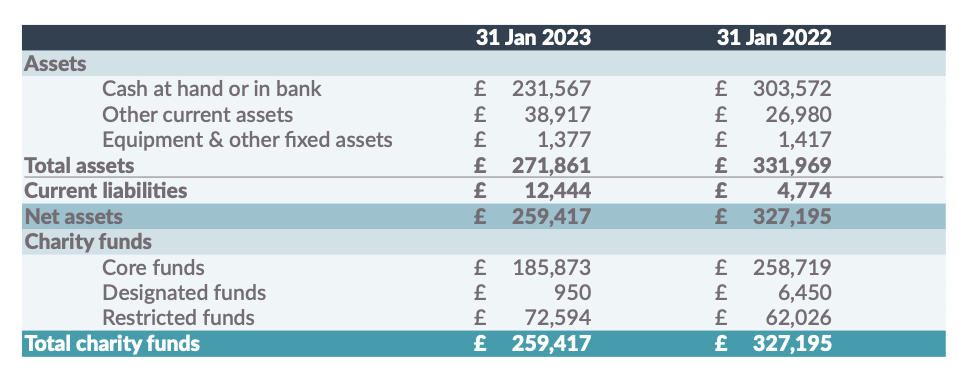
Our full Statement of Financial Activities is available on request from the office and will soon be available to download from the Companies House website.
Income and Expenditure
